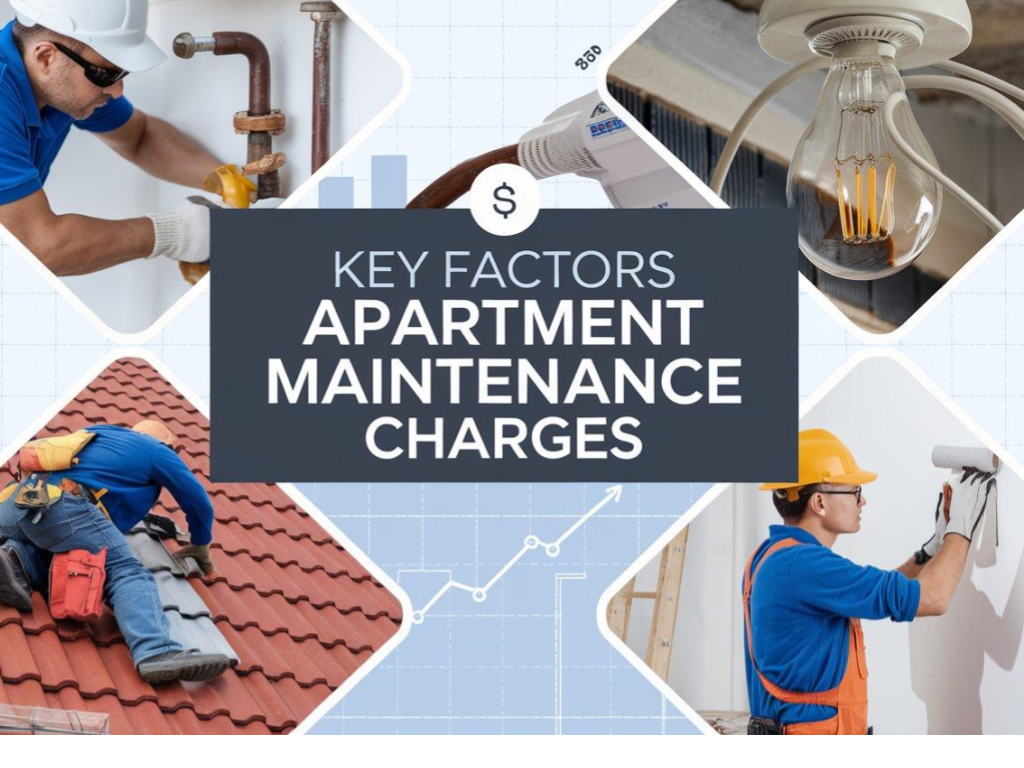Browse By Category
Browse By Location
Exclusive Offers & Discounts Await

Enjoy Life At Its Finest With Desai Homes

November 05, 2024
Max 6 min read
The property ownership pattern in this country has undergone a significant transformation due to the real estate boom in India. Nowadays, more and more people are opting for apartments due to their convenience and affordability. Although an apartment building offers various facilities, it is crucial to pay the maintenance charge to guarantee the smooth functioning of all amenities. In this article, we’ll discuss the key factors influencing the maintenance charges of flats/apartments.
The apartment maintenance charge is a fee collected by the residential society to ensure the buildings and complex premises are well-maintained. It covers all the necessary expenses, such as maintenance, common area electricity, common areas cleaning, waste management, security, caretakers and service charges, to guarantee an exceptional living experience for the residents. Depending on the size of the unit, this charge can vary. The amenities you receive are directly proportional to these. The more you pay, the better the facilities you’ll receive, and vice versa.
The maintenance charges on flats are not only a financial obligation but also a contractual commitment that is firmly established in the builder-buyer agreement. In accordance with Section 6 of the RERA Act 2016, it is mandatory for every allottee entering into such an agreement to promptly settle these charges.
Every year, the cost of repairing and maintaining the building is one of the major expenses that comes to be managed by the Owner’s Association. When it comes to the costs of housekeeping, security personnel, equipment, power, and other expenses, the residents split them evenly among themselves. To help you understand the maintenance charges better, here are a few typical components you should familiarize yourself with.
If a member fails to pay the flat’s maintenance charge multiple times, they are ineligible to participate in the society’s Managing Committee election. Additionally, any individual who wishes to compete for the management committee position must have a clean record of fee payment. The high court has even stated that society has the right to expel individuals who frequently fail to pay the charges. If the outstanding dues are not paid, the defaulter may face difficulties in selling the flat or unit. If the dues are not paid, the society can refuse to issue a NOC.
Also Read: Formalities for Registering a Flat/Apartment
The amount of the maintenance fee can differ between societies. The charges are determined by several variables listed below.
A sinking fund, also called an emergency reserve, is money saved for unexpected situations. The amount of money in the fund is determined by the governing committee of the housing organization.
There are several factors that impact the cost of maintaining a flat, and these are just a few examples. Ensure that you ask your apartment builder or the Resident Welfare Association (RWA) about the expenses connected to that specific complex.
The real estate market is experiencing a steady rise in demand for both residential and commercial properties. To make an informed decision when choosing an apartment, it is recommended to take into account the recurring monthly fees for maintenance charges, as outlined by RERA.
To put it simply, maintenance fees are crucial and every owner of a flat or apartment bears the obligation of paying them. These fees are crucial as they cover various services you are entitled to as the property’s legal owner, ensuring a peaceful and enjoyable living experience in the apartment.
Desai Homes is one of the best builders in Kerala, offering a wide range of 2 and 3 BHK apartments across prime locations, including Kottayam, Thrissur, Kozhikode, Kochi, Trivandrum, and Thiruvalla, designed to provide modern living spaces with quality construction and thoughtful amenities.
For more information and enquiries feel free to contact us now!
Welcome to Desai Homes, where your dream of owning a perfect home becomes a reality. As one of the leading real estate developers and builders in Kerala, we take pride in crafting exquisite living spaces that embody elegance, quality, affordability and comfort. Every construction project is undertaken with the utmost inspection and care, ensuring every detail is meticulously executed to exceed your expectations. We embrace cutting-edge technologies to create homes that stand the test of time, doing our part for sustainability and innovation. Everything we do is centred on delivering excellent & exceptional customer service. We are aware that a house is more than simply a building; it is also your safe space, where cherished memories are created. We go above and beyond to offer personalised solutions that are catered to your needs. Discover a range of thoughtfully designed projects in Kochi, Kottayam, Thiruvalla, Trivandrum, and Thrissur, each boasting top-notch amenities, easy accessibility, prime locations, and worth every penny. We have something to suit every lifestyle and budget. Come, find the perfect abode for you and your loved ones with Desai Homes. Experience the epitome of luxury, functionality, and serenity with us.